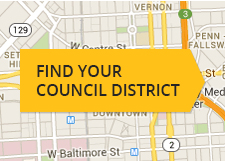Legislation Keeping Water Bills Affordable & Transparent Moves Forward
Legislation Keeping Water Bills Affordable & Transparent Moves Forward
Taxation Committee Moves Water Accountability and Equity Act to Full Council
BALTIMORE, MD (September 26, 2019) — The Taxation, Finance and Economic Development Committee of the Baltimore City Council voted unanimously to move the Water Accountability and Equity Act to 2nd Reader. The bill, which has been under consideration by the Committee since May, will now be considered by the full City Council.
"Everywhere I go in Baltimore, the high cost of water and water billing issues top the list of concerns among residents," said City Council President Scott. "Building a more accountable and equitable water system is of the utmost importance. We have an opportunity to do that with this legislation."
Council President Scott heard passionate testimony about unaffordable and erroneous water bills at each of the nine Legislative Town Halls he hosted across Baltimore in August and September.
“There are some issues that should not be politicized and this should be one of them,” said City Council Vice President Sharon Green Middleton, who is Chair of the Taxation Committee. “It is our job to be the protectors of those who cannot defend themselves,” such as low-income residents and residents on fixed incomes.
The Water Accountability and Equity Act (18-0307), introduced on December 3, 2018 by then-Council President Bernard C. “Jack” Young, ensures the cost of water is affordable for all Baltimore City residents by creating an income-based water billing system. Philadelphia passed similar legislation in 2017.
The legislation establishes a system of tiered credits, which would ensure residents earning between 0-200% of the Federal Poverty Line receive water bills they can actually afford to pay. Currently, the Federal Poverty Line for a family of four is $25,750 a year.
2019 Federal Poverty Line

Analysis by the Council President's Office shows a credit comparison between the Water-For-All credit outlined in the Water Accountability and Equity Act and existing support programs administered by the Department of Public Works.
For example, a family of three making $9,000 a year would see their water bill capped at 1% of their annual income under the credit established in the Water Accountability and Equity Act. Under DPW's program, the family would pay more than twice as much.


The legislation would also increase transparency in the dispute process for erroneous water bills. The bill creates a standard and open dispute process, available to all customers regardless of income or experience navigating local government bureaucracy.
Read Bill 18-0307: Water Accountability and Equity Act here.
CONTACT
Candance Greene
Deputy Director of Communications
Office of City Council President Nick J. Mosby
443-602-5346
candance.greene@baltimorecity.gov

